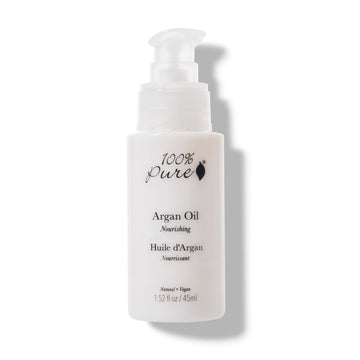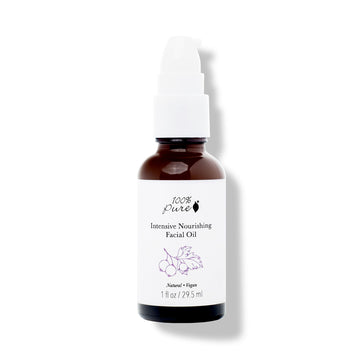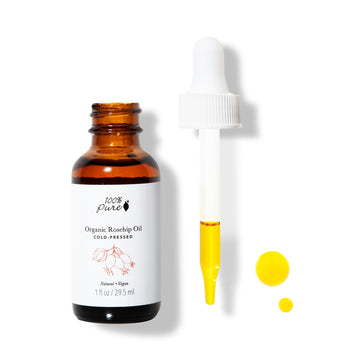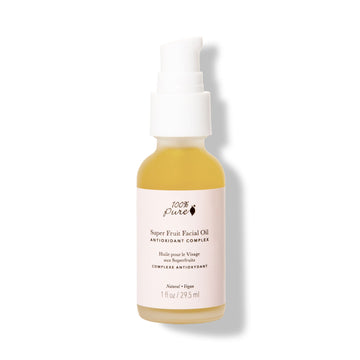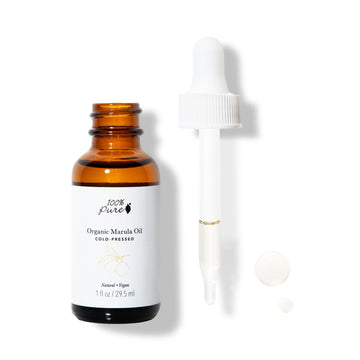All of Your Questions About Face Oil Answered!
Written by: 100% PURE®
If you think face oils are just a new trend that will soon go away then you couldn’t be more wrong. Applying oils on the face to nourish the skin is an ancient Egyptian practice. They used to put Moringa Oil on their face for its innumerable benefits.
There has always been some kind of stigma around the regular use of face oils. Most of us grew up thinking that applying oil on the face would bring nothing but disastrous results. Due to a lack of education about skincare, there was no one to tell us that face oil doesn't work like regular oil that we put on the scalp. Good face oils do get absorbed into the skin quickly without leaving that greasy residue.
Well, if you still aren’t convinced and want to learn more about face oil then you have come to the right place.
In all the things that we used to make our skin better especially during our teenage years, oil somehow never made the cut. Well, to be fair two decades ago skincare wasn't what it is today. Modern skincare researchers are doing their best in finding more benefits from the old trustworthy ingredients. One such product "oil" which usually comes from natural resources got more refined in all these past years. Now, there are specific oils available that are suitable for your skin type.

The main job of face oils is to hydrate the skin. However, keep in mind to only buy facial oils that are made from a natural source and not synthetic ones. Natural face oils are pure oil that commonly comes from one main ingredient like almond, coconut, tea tree, or argan.
You can either decide to use the one made from a single ingredient or you can try mixing some oils to create a perfect blend. You can also buy facial oils that have some other natural ingredients that add more efficiency and effectiveness. Now, let’s talk about some of the main benefits of using facial oil.
Great for Reducing Wrinkles
No one’s skin is safe from harsh UV rays and free radical damage. This is why some oils have antioxidants that keep early aging signs away from your skin. You may be thinking why use oils for reducing wrinkles instead of some expensive product? Well, oils, in this case, grapeseed oil gently work on those fine lines and wrinkles. The best thing is that even people with oily skin can use grapeseed oil as it is non-greasy and lightweight.
No More Dry Skin
This one’s a no-brainer. What can hydrate dry skin better than oil? Losing moisture from the skin is a natural phenomenon which is why it is recommended to start providing skin moisture, externally through serums and creams. While most of these perform the same function which is moisturizing the upper layer of skin, face oils do go one extra mile. In addition to hydrating the skin, oils also create a protective barrier that doesn't let moisture evaporate from the skin.
Top-Tier Skin Protector
Oils are lipophilic, which means they can penetrate the skin deeply. This helps them in creating a thick layer between the skin and the external pollutants. These oils also nourish and strengthen the skin so that it doesn’t break out easily. If you live in a big city where air pollution has just become a regular part of your life then you need to apply face oils more than anyone else.
Newsletter Subscribe
for more blog updates and exclusive discounts
Substitute for Makeup Primers
There is no greater joy in finding a skincare product that also works well for makeup. Fast-absorbing oil can also be used as your basic primer. Take a pea-sized amount of the oil and then put it on your face before applying the foundation. This will quickly smoothen your skin and even erase any dry patches or bump.
Shrink Enlarged Pores
One of the biggest reasons for enlarged pores is uncleaned dirt trapped in them. When oils go into these pores they soften the grim and dirt. After this, it becomes easier to clean and pores appear smaller. When the pores aren’t dirty they don’t seem as noticeable. However, read the oil formula carefully and only use it if it's non-comedogenic. Otherwise, the oil will also get settled in the pores.
Calm the Irritated Skin & Zits
Most oils are made from sources that have anti-inflammatory properties. Due to this reason, irritated skin with bumps and pimples can benefit greatly from facial oils. Tea tree oil is most well-known for cleaning the bacteria from the skin which reduces acne and pimple marks rather quickly.
There was a time when face oils weren’t considered for everyone but now things have changed. Today every skin type has an appropriate face oil for it. Although if you have an extreme skin condition like dermatitis or rosacea, you should try consulting with a doctor first. Let’s take a look at the perfect match of face oils with their suitable skin type:
Dry and Dehydrated Skin: Try using oils that are high in omega-3 and fatty acids. The good news is you have a wide range to choose from like coconut, rosehip, Abyssinian, marula, moringa oil, etc.
Aging Skin: Try acai, borage, or argan oil to get rid of aging signs.
Oily or Acne Prone Skin: Try using pumpkin seed or grape seed oil for regular use. For specifically removing the acne use tea tree or black cumin oil.
Sensitive Skin: Try using single-ingredient oil e.g squalane and avoid blends.
To maximize the advantages of using facial oil, you should know how to apply it properly. If you think you can apply face oil just like a serum then you are highly mistaken. You need to understand the proper order before using facial oil.
Face oils should be the final product in your night or daytime skincare routine. The reason behind this is the thick texture of face oils traps whatever product you applied before it. Also, any serum or lotion that you apply after the face oil won’t be effective for your skin.
Use face oil only when you are done with all the other products like cleanser, toner, serum, and moisturizer. Take 3 to 4 small drops of the oil on your palm and massage it gently on your face and neck. Remember, unmassaged oil sits on the top of your skin so don’t just pat it on your skin.

Our Face Oils are made in a cosmetically elegant way that has lightweight formulas with maximum nutrition. The purity of the oil is fully retained without adding any toxic chemicals. This is why our face oils are safe to use daily. Now let’s take a look at our best-selling 100% Pure Face Oils.
Argan Oil
In face oils, argan oil truly holds a special position as it is enriched with everything that can wonderfully transform your skin. It has Vitamin E, phenols, carotenes, squalene, and essential fatty acids, basically everything that will end your search for a perfect oil.
Intensive Nourishing Facial Oil
This lightweight vegan facial oil is best for keeping the skin moisturized for a long time. It has an amazing blend of clarifying oils and anti-aging antioxidants, which is why it is suitable to use for all skin types.
Organic Rosehip Oil
Be it healthy skin or lustrous hair, you can get both with rosehip oil. The vitamins and fatty acids in our Organic Rosehip oil make sure that you won’t have to worry about fine lines or hair loss again.
Super Fruit Facial Oil
This non-greasy pure facial oil is made by cold pressing the seeds of fruits that are enriched with antioxidants like acai and goji berries. It is great for increasing skin elasticity and a youthful glow.
Organic Marula Oil
This luxurious oil is made by cold pressing the marula. The oleic and linoleic acids present in marula oil rejuvenate skin and make it incredibly soft.
What are face oils, and how do they benefit the skin?
Face oils are concentrated liquids derived from natural sources like seeds, nuts, and flowers, and are packed with beneficial nutrients, fatty acids, and antioxidants. They provide deep nourishment and hydration, strengthen the skin’s natural barrier, and can help to balance oil production. Face oils are effective in improving skin texture, adding radiance, and can target specific skin concerns like aging, dryness, and even acne.
Can face oils be used on oily or acne-prone skin?
Yes, certain face oils can be beneficial for oily or acne-prone skin. Contrary to popular belief, the right face oils won’t clog pores or increase oiliness. In fact, they can help regulate sebum production. Lightweight oils like jojoba, rosehip, and grapeseed oil are non-comedogenic and can be particularly good choices for oily and acne-prone skin types.
How should face oils be applied in a skincare routine?
Face oils should typically be applied after water-based products like serums and before heavier creams or moisturizers. A few drops are enough, and they can be gently pressed or massaged into the skin. For drier skin types, mixing a few drops of oil with your moisturizer can enhance hydration.
What are the best face oils for anti-aging?
For anti-aging, oils rich in antioxidants and essential fatty acids are ideal. Argan oil and rosehip oil are excellent choices. They are known for their regenerative properties and can help reduce the appearance of wrinkles and fine lines, improve elasticity, and provide deep hydration.
How can I choose the right face oil for my skin type?
To choose the right face oil for your skin type, consider your primary skin concerns. For dry skin, look for oils rich in oleic acid like avocado or marula oil. If you have oily skin, lightweight, linoleic acid-rich oils like grapeseed or rosehip are preferable. For sensitive skin, chamomile and calendula oils are soothing options. Always check for high-quality, cold-pressed oils, as they retain more nutrients.
- Tags: December-2023, Skin Care, skincare
We carefully hand-select products based on strict purity standards, and only recommend products we feel meet this criteria. 100% PURE™ may earn a small commission for products purchased through affiliate links.
The information in this article is for educational use, and not intended to substitute professional medical advice, diagnosis, or treatment and should not be used as such.


